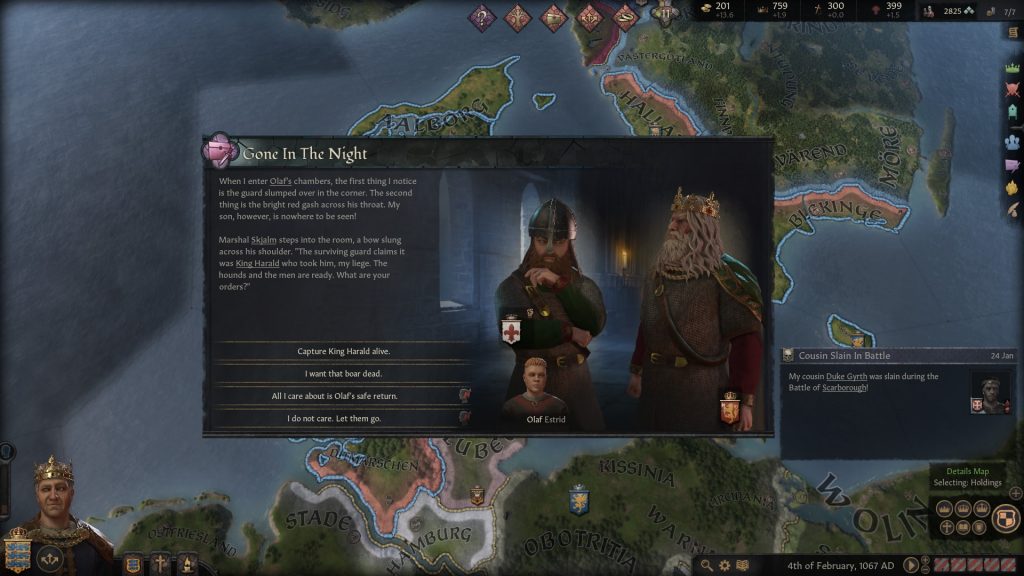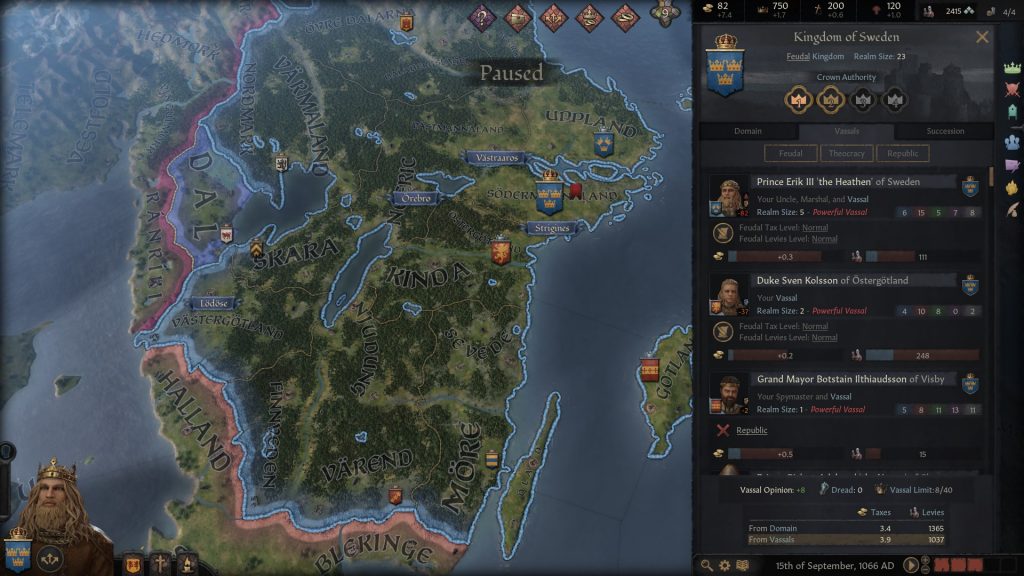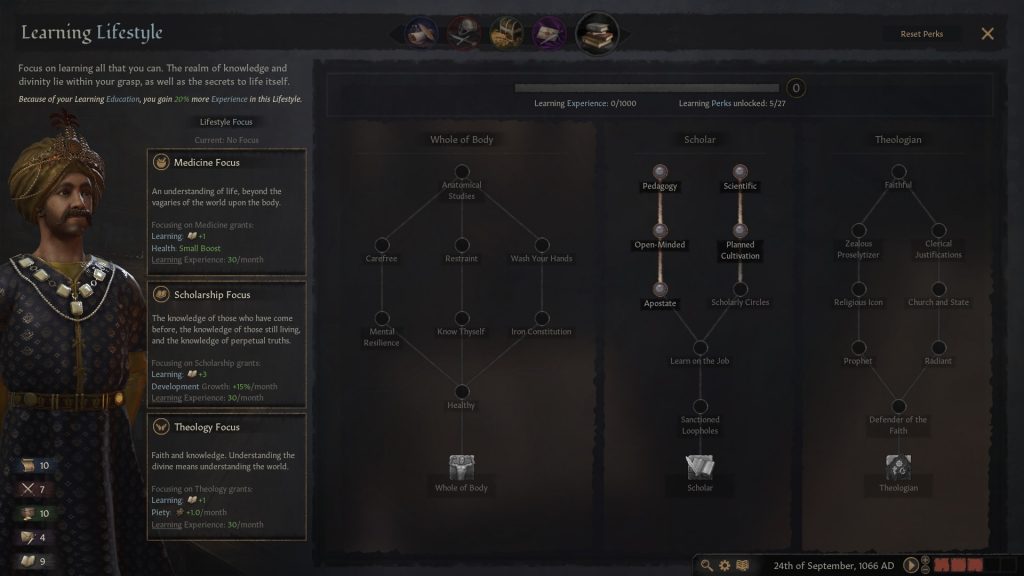Reviewing a game like Crusader Kings III is a pretty dense task. The game is a thick, weighty tome, filled with abandoned bookmarks and long stretches of seemingly dull historical information. This is a game that could be played for years, with random character arcs spinning off of whatever decisions you make in an endlessly absorbing quasi-historical simulation.
As far as these strategy games go – and Paradox is essentially king of the market for them – Crusader Kings III is actually fairly friendly to newbies. You wouldn’t believe it for a second, looking at the teeming menus and interlinking systems, but it doesn’t take too long to get to grips with what affects what. You’ll still be learning little things about the game twenty hours in, but that’s fairly standard – if you try to resist the urge to learn everything about the game to “win” and just charge headlong into whatever historical fantasy you want to play out, you’ll probably have a pretty good time regardless.

The tutorial does its best to get you started, but it would have to be an entire four-hour campaign in itself to be fully successful. You’ll spend a bit of time living the life of Petty King Murchad of Ireland, finding a spouse, marrying off your son, and invading a neighbouring territory. The tutorial really just shows you some of the core things you’ll need to do in your time with Crusader Kings III, getting the most out of it will require a lot of independent exploration and some trial and error. I was carrying out schemes every five minutes against people I’d just met just to see what would happen.
The amount of information flying around at any given time can be a little overwhelming. I started playing in the Viking age, as a Danish Jarl of Jutland, looking directly over at England like the tempting prize it was back then. One of the first things I did was marry to start producing heirs, but I married the daughter of the lord of Yorvik, which inadvertently drew me into the Ragnarsson’s conquest of England. So basically fresh out of my marriage bed, I was sending an army to Yorvik to mess up some Anglo-Saxons.
Then my wife didn’t produce any offspring, so I decided to take as many concubines as possible just in case, and after about half an hour of play I had seven kids, each potential bargaining tools with neighbouring countries, each slowly developing their own personalities and needs. I’m still waiting for my wife, the long suffering Saga, to ask about where all these extra sprogs came from, but she seems cool with it so far. For a game about large scale strategy, it’s strange how personal Crusader Kings III can get. I’ve developed a burning hatred for neighbouring Chieftain Kjotve, who keeps narrowly dodging all my attempts to murder him.

Crusader Kings III’s scope for historical creativity is grand. I mainly used it as a viking fantasy vehicle, aiming to dominate all of Scandinavia and Britain under my drunken, lustful reign, but it basically turns history into a playground. There’s a point where you feel like you can essentially sit back and let the game play itself, soaking up the debauched, randomised character arcs, snooping on your neighbours’ densely woven conflicts like you’re watching through a hole in the fence.
It’s possible to dip your toes into a wide array of historical backdrops, either assuming the role of an existing ruler from that time or creating your own and forging your own story. This is where the real joy of Crusader Kings III is born – rather than reliving history, you can warp it, spinning epic battles that should never have been. What if the vikings conquered all of Europe through marriage and military might? What if Great Britain was unified much earlier on by a complicated council of rulers from far and wide, developing the strength to repel any invasion?

It makes history into your plaything, and, perhaps most compellingly, gives players the power to live whatever story they choose whilst presenting a wide array of strategy options to pursue it. You can dominate through military might, using carefully arranged “Cassus belli” to declare war, or you can be insidious and seductive, spreading your influence through subtle means. However you want to play, Crusader Kings III will give you the means to do it, and that’s a pretty respectable accomplishment. There’s no game over, not until you and all your heirs are gone, so you won’t just be living one life – you’ll be forging a dynasty for the ages.
This is given extra spice through some fantastic flavour text and the option to spec your ruler into a “lifestyle” – this allows you to shape the way they grow, whether it’s through subtlety, strength or diplomacy. Crusader Kings II had some RPG-lite mechanics, but this is a full on adoption of the genre, incorporated seamlessly into III‘s sprawling world. The game is so rich, so dense with opportunities for serious drama and off-the-wall randomness, that having this extra RPG element really just fills it out into something completely exceptional.
Crusader Kings III overall thoughts
A huge, historical playground with infinite scope for medieval drama and rewarding strategical gameplay. To get the most out of Crusader Kings III, you’ll need to pay attention to it at first, as tempting as it might be to break free of the reigns and blaze your way across the world. It might not be accessible – few games of this depth are – but it does a much better job of easing players in than its predecessors. When you have a decent grasp on the intricate world and subtleties of rule, the possibilities are endless.
Crusader Kings III was developed and published by Paradox. It’s available on Steam – don’t forget to check out more FULLSYNC game reviews right here!